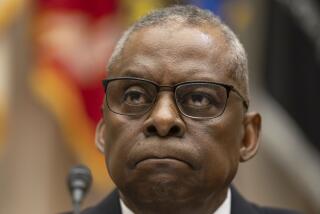A Record of Misjudgment
- Share via
Secretary of Defense Donald H. Rumsfeld seems unable, even now, to grasp what is going wrong in Iraq.
It is not just the abuses at Abu Ghraib prison outside Baghdad, though those images of humiliation will poison attitudes toward the United States for years.
It is not just the shocking delays in telling even President Bush about the extent of prisoners’ mistreatment.
What will haunt Rumsfeld is his much longer record of misjudgment.
The civilian leadership of the Pentagon, particularly Rumsfeld and his deputy, Paul Wolfowitz, ignored the best advice of military and civilian experts on Iraq and the Arab world concerning the likely aftermath of invasion.
Gen. Eric Shinseki, then the Army’s top uniformed commander, warned a month before the invasion of Iraq that peacekeeping and humanitarian operations would require “several hundred thousand” troops. Wolfowitz dismissed that advice, which proved correct even as Shinseki was forced out of his command.
In the last week, the Bush administration has announced that it will send 20,000 additional troops to Iraq earlier than expected, will keep 135,000 troops there through the end of 2005 and will seek an additional $25 billion for the war’s aftermath.
The increase in troop strength is the latest example of too little and too late. With too few U.S. troops on the ground, insurgents were able to coalesce. By now it is not just Saddam Hussein acolytes firing rocket-propelled grenades and planting explosives; they are joined by members of the Shiite Muslim community that was persecuted and brutalized by Hussein.
The Army is sending more armored vehicles for the troops -- far later than it should have. U.S. officials are readmitting some members of Hussein’s Baath Party to government jobs -- far later than they should have.
The miscues appear worse against the flawed justifications for the invasion of Iraq. The administration sold the war as necessary to rid Iraq of weapons of mass destruction. None have been found.
The administration later switched to claiming the country would become a democratic beacon for the Middle East. That was always doubtful, and quarrels among religious factions and ethnic groups have put that target very far away.
The mishandling of postwar Iraq has become a recruiting tool for terrorists.
Hussein had nothing to do with the Sept. 11 attacks on New York and Washington, but the invasion and subsequent failure to provide security became fodder for Osama bin Laden and his denunciations of a “crusade” against a Muslim nation.
Rumsfeld began his testimony Friday before the Senate and House Armed Services committees accurately: “These events occurred on my watch. As secretary of Defense I am accountable for them, was responsible for them and I take full responsibility.”
However, he bristled at later questions, his usual style. That can work when U.S. forces rout the Taliban in Afghanistan and Hussein’s army in Iraq. A more complicated situation responds poorly to immovable certainty (though by the end of the rambling House hearings later, anyone could be forgiven frustration).
Committee members read a litany of improvements in Iraq and heroic efforts by soldiers. That’s worth remembering, but misses the point of what Iraq is doing to the United States: lives lost, billions spent, a military spread thin, relations with allies damaged. Recitations of good deeds also show a continued lack of understanding of the effect of the pictures from Abu Ghraib in the Middle East.
In the end, however, what is wrong is not Rumsfeld’s fault alone.
The president said Wednesday that American troops “will have all the resources they need to get the job done.” What is that job? It can’t be finding weapons of mass destruction or changing the Arab world. Then what is it? And how will the goal be achieved?
Answers to the big questions are what Americans need to hear from Bush.
Lack of a clear goal has exacerbated Rumsfeld’s failings. Let’s hear a strategic plan from Sen. John Kerry, the presumed Democratic presidential nominee, as well.
President Johnson pushed Robert S. McNamara out of the Defense Department and into the leadership of the World Bank in 1968 in the midst of the Vietnam War.
But the departure of Rumsfeld now could leave a vacuum of leadership at the height of the current scandal and at a critical point in the Iraq conflict.
This editorial page does not -- yet -- join growing calls for the Defense secretary’s resignation.
The war in Iraq will be lost without a strategic vision. Bush and Rumsfeld remain obligated to provide it. If they cannot, the failure will go much further than Rumsfeld.
More to Read
Get the L.A. Times Politics newsletter
Deeply reported insights into legislation, politics and policy from Sacramento, Washington and beyond. In your inbox twice per week.
You may occasionally receive promotional content from the Los Angeles Times.










